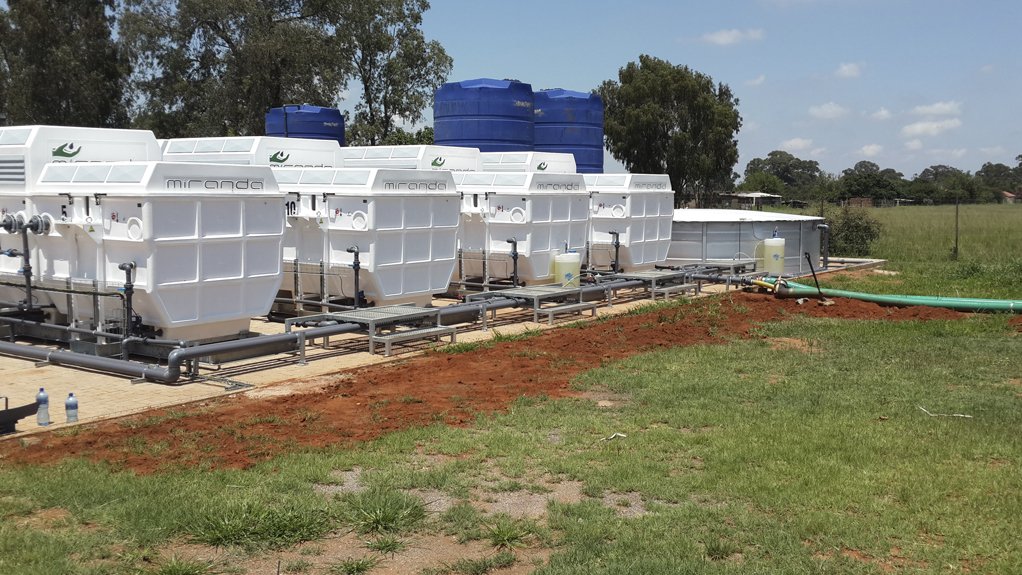Portable toilet and sanitation solu- tions company Sanitech has implemented a portable modular waste- water treatment solution that enables quick commissioning and versatility in upscaling or downscaling, depending on requirements.
A single module of the wastewater treat- ment solution can treat up to 50 000 ℓ/d of effluent, and the number of modules that can be added to larger plants is “technically unlimited”, says Sanitech environmental systems director Gerhard Britz.
The only constraint is the space required to install the modules and associated infrastructure, such as piping, holding tanks and sludge containers.
He notes that the solution is ideal for muni- cipal entities involved in handling waste- water and suitable for treatment facilities either operating at overcapacity or under- performing, owing to aged equipment or lack of maintenance, as well as areas with nonexistent treatment facilities.
“New housing developments, for example, can be connected to a treatment plant using Sanitech’s wastewater treatment modules without having to connect the development to an existing, and probably already overloaded, plant,” says Britz, adding that Sanitech has tendered for a Reconstruction and Development Programme housing development, comprising 3 500 houses and requiring a wastewater treatment facility.
The solution is also suited to large mining and construction operations, either tempo- rary or permanent, with Sanitech also offering a rent-to-buy option for cost-effective ownership.
He adds that municipal wastewater treatment plants are currently under a lot of strain, with many of these being in a critical state.
Sanitech currently uses municipal waste- water treatment plants to discharge the effluent from its portable toilet operations; being aware of this critical state prompted the company to investigate and pursue por- table and modular treatment plants.
This was done to ease the pressure that Sanitech exerted on municipal facilities and offered municipalities a solution, should they require it. “The solution also reduces our logistical costs significantly,” adds Britz.
Quality Is Key
A key criteria for the modular treatment plant was that it had to use superior technology to ensure the end product (produced water) is cleaned beyond the requirements of local standards and ensured its sustainability in the industry.
“As part of our investigation, we conducted a due diligence study to find out what types of solutions are available locally and overseas. Although a few solutions met some of our criteria, we were not 100% satisfied,” Britz says.
However, through a local distributor, Sanitech managed to source a solution from Miranda, a Turkish company.
Although the modules of the plants are imported and commissioned mostly with the Turkish technology in place, Sanitech has added a few auxiliary modules to further purify wastewater upstream and down- stream of the plant. These include filters installed upstream to remove large particulate matter, a sand and ultrafiltration filter, and a chlorinator downstream to purify produced water.
Sanitech, as an ISO 18 001- and ISO 14 001- certified company, is compelled to meet these requirements for wastewater disposal and the cleanliness levels of the water produced, says Britz.
Produced water from the plant complies with local standards set by the Department of Water and Sanitation and is suitable (without chlorination) for use in crop irriga- tion and in other processes, such as those at foundries and industrial cooling applications, as well as reflushing toilets.
Adding a reverse-osmosis module allows for the purification of produced water into potable water, thereby creating a hypothe- tical “closed loop” system where all water is recycled indefinitely, he tells Engineering News.
Proven Technology
Sanitech has an operational wastewater treatment plant in Witbank, near the Kendal power station, in Mpumalanga, which can treat 200 000 m3/d to 400 000 m3/d of effluent.
Sanitech has also formulated proposals for mines in Zambia and Botswana.
Meanwhile, Britz says, the modules use significantly less electricity than other wastewater treatment plants. “We can install solar photovoltaic panels atop the modules to power them during the day.”
The modules also produce low noise levels and significantly lower odour levels than other plants. “We have installed a wastewater treat- ment plant in close proximity to a residen- tial camp and the odour produced was negligible, thereby ensuring comfort and peace of mind for residents. They did not even realise a domestic wastewater treat- ment plant was there,” he says.
The solid end product is stabilised sludge, which is suitable for use as fertiliser without any additional treatment processes required.
Edited by: Martin Zhuwakinyu
Creamer Media Senior Deputy Editor
EMAIL THIS ARTICLE SAVE THIS ARTICLE
To subscribe email subscriptions@creamermedia.co.za or click here
To advertise email advertising@creamermedia.co.za or click here













